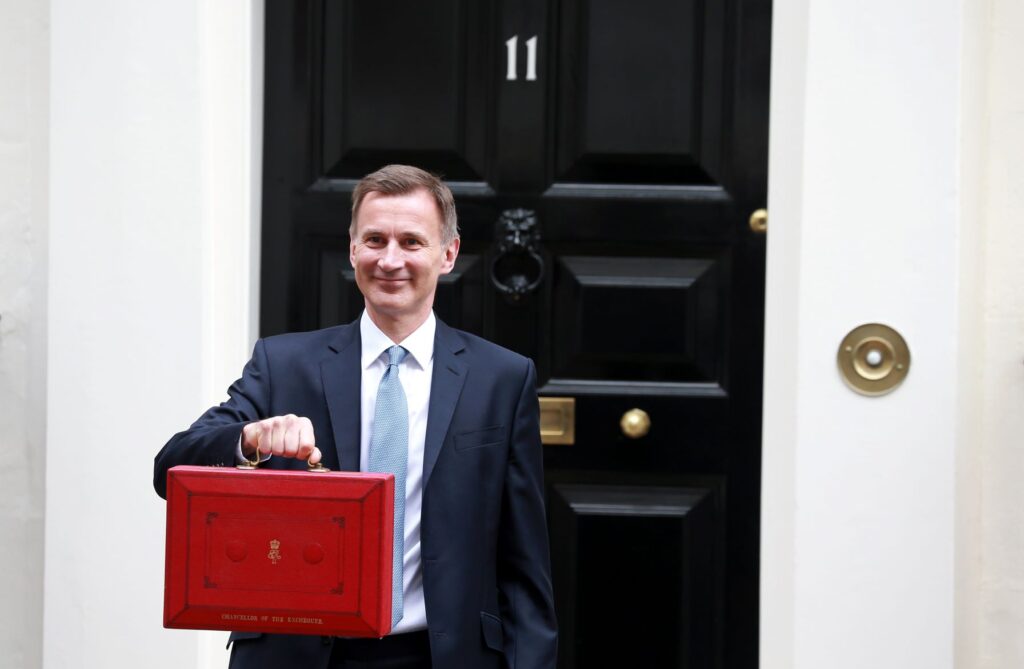Spring Budget Summary 2023

Chancellor Hunt billed his Budget as a Budget for growth with emphasis on fixing problems in the labour market alongside improving business investment and innovation
For the former he has addressed barriers to staying in work experienced by high earners with large pension pots, and provided some help to parents who are looking for affordable childcare.
Under the investment heading he announced incentives for investment in 12 new investment zones, and a ‘fully expensed‘ system of obtaining tax relief for plant and machinery.
The chancellor also confirmed that the energy price guarantee for domestic consumers would remain in place for another three months keeping the annual bill for an average household at £2,500 for the year.
Pension reform
High earners tend to max-out their annual pensions allowance of £40,000 quite easily, especially if they are a member of a final salary pension scheme. The annul allowance will rise to £60,000 form 6 April 2023 and the facility to carry forward unused allowance for three years remains in place.
Taxpayers with adjusted net income in excess of £200,000 and income including pension contributions in excess of £240,000, have their annual allowance tapered down by £1 for every £2 over the higher figure down to a minimum of £4000. This income threshold will increase to £260,000, and the minimum tapered annual allowance increase to £10,000, also from 6 April 2023
Taxpayers who started to draw the taxed portion of their defined contribution pension, are subject to a lower money purchase annual allowance (MPAA) of only £4,000. This can catch out individuals who have retired early but return to paid employment and become enrolled in a workplace pension. Hunt has also increased the MPAA to £10,000 from 6 April 2023.
The pensions lifetime allowance catches those who have diligently saved all their life and built up a significant pension pot. If that pot exceeds their lifetime allowance of £1.0731m at the time they start to draw their benefits the excess value is subject to a lifetime allowance tax charge at 25% or 55% on lump sum. This pensions lifetime allowance charge is scrapped from 6 April 2023 and the lifetime allowance will be abolished completely in a future Finance Bill.

Childcare Support
Amount of Universal Credit (UC) that is awarded to cover childcare payments will be increased to maximum of £951 per month for first child and to £1630 for two children. This only helps UC claimants who are already paying out the maximum in childcare costs. The current limits are £646.35 per month for one child and £1108.04 for two or more children, but those amounts haven‘t changed since 2016.
The most important change is around the timing of the UC payment. Currently the parent must pay the childcare costs up front and claim that cost in arrears. From a date to be confirmed the parent will be able to claim the childcare fees up front. This will help parents who want to return to work but can‘t afford to pay the childcare fees in advance before they get their first pay cheque.
The Chancellor also announced an extension of free childcare places to children aged one and two in England, to match the 15 or 30 hours of free childcare currently provided to three and four year olds in term time. This will be rolled-out in stages:
– From April 2024, all working parents of two-year-olds will be able to access 15 hours per week.
– From September 2024, all working parents of children aged nine months up to three years old will be able to access 15 hours per week.
– From September 2025 all working parents of children aged nine months up to three years old will be able to access 30 hours free childcare per week.
To qualify for the free childcare places the parents must be working and each earning at least £659 per month, but not over £100,000 per year.
The staff to chid ratios in nurseries will be changed to an optional 1: 5 from the current 1: 4 for two year olds, to align with the ratios that apply in Scotland.
The payment made by the Government to nurseries to provide these free places will be increase by around 30%. Currently amount paid is well below the hourly cost of providing care, so the free places have to be cross-subsidised by charging other parents more.
As education is a devolved matter, any decision to expand the free childcare places in Scotland, Northern Ireland, and Wales will be up to those regional governments.
To increase the number of childminders the Government will provide all newly registered childminders with a start-up grant of £600 and those who register with a childminder agency will receive a grant of £1,200.

Disability Benefits
Work capability assessment (WCA), which determines whether people are too ill to work, will be removed. Currently disabled people need to have a health assessment and be found incapable of work to receive additional income support through universal credit and other benefits. This assessment is likely to be replaced by another test, perhaps that for the personal independence payment (PIP).
If individuals are not subject to the WCA, they should be able to take up a job trial without fear of losing all the addition help they receive through the benefits system, should that job not work out.

Corporation Tax
From 1 April 2023 the main rate of corporation tax will rise from 19% to 25%, but the small profits rate will stay at 19%. The boundary between these two rates is nominally set at annual profits of £50,000, but in practice there is a £200,000 marginal relief zone as follows:
– below £50,000: small profits rate of 19%
– above £250,000: main rate of 25%
– between £50,000 and £250,000: main rate of 25% less marginal relief.
These profit thresholds are reduced proportionally if the accounting period is less than 12 months, or if the company has associated companies. For example, where there are two associated companies the thresholds will be £25,000 and £125,000.
Marginal relief results in an effective rate of 26.5% on the profits in the marginal relief zone.

Capital Allowances
The super deduction capital allowances, which provide companies with a deduction of 130% of the cost of new plant and machinery, will end from 1 April 2023 as scheduled.
In their place the Chancellor has proposed a new system of full expensing of the cost of all plant and machinery purchased new and unused by companies between 1 April 2023 and 31 March 2026. This is effectively a 100% first year allowance for the assets which would have qualified for the super deduction. The Chancellor indicated that this relief may be made permanent after a review.
Those assets which qualify for the special rate of 50% continue to benefit from that rate when purchased by companies on and after 1 April 2023.
Most businesses can get a 100% deduction for expenditure on assets, other than cars, using the Annual Investment Allowance (AIA) which now has a permanent cap of £1 million per year. Second-hand assets qualify for the AIA.
Investment Incentives
“Levelling up” has been the mantra of the Conservative Government since it was elected in December 2019, but there has been little evidence of any significant investment in the regions to achieve this. Chancellor Hunt hopes that 12 new investment zones clustered around research institutes such as Universities will change this, with up to £80m of grants given over five years to encourage growth in areas of technology, creative industries, life sciences, advanced manufacturing and green industries.
These investment zones will benefit from reduced stamp duty land tax, discounted business rates and limited exemptions from employer‘s NIC for new employees. The Investment Zones will have access to flexible grant funding to support skills and incentivise apprenticeships, provide specialist business support and improve local infrastructure, dependent on local requirements.
The first eight low tax zones will be located in the East Midlands, Greater Manchester, Liverpool, North East, South Yorkshire, Tees Valley, West Midlands and West Yorkshire. A further four investment zones will be set up in Scotland, Wales and Northern Ireland.
R&D Row Back
In Chancellor Hunt‘s Autumn Statement, he announced a reduction in R&D tax credit relief from 130% to 86%, and a cut in the payable tax credit from 14.5% of the loss surrendered to only 10% of that loss. These new rates apply to expenditure incurred from 1 April 2023 included in claims made under the small company scheme and were legislated for in FA 2023.
However, in this Spring Budget the Chancellor has reinstated the 14.5% payable tax credit for R&D intensive SMEs. These are companies with qualifying R&D expenditure at least equal to 40% of their total expenditure for the relevant period. For these purposes, ‘total expenditure‘ will be defined as the expenditure in the profit and loss account, plus any amount included in the R&D claim, less any non-deductible expenditure.
The restriction on some overseas expenditure for R&D claims announced last year will now come into effect from 1 April 2024 instead of 1 April 2023.
The R&D expenditure credit (RDEC) is the method by which large companies claim enhanced tax relief for R&D expenditure. The rate of RDEC will increase from 13% to 20% on 1 April 2023.
Seed Enterprise Investment Scheme
The Seed Enterprise Investment Scheme (SEIS) is only available to relatively new, small companies to help them raise equity capital.
The amount that a single company can raise using SEIS will increase from £150,000 to £250,000, and the age limit on the qualifying trade will be raised from two year to three years. In addition, the maximum an investor can subscribe for shares under the scheme will double from £100,000 to £200,000. All these changes will take effect for shares issued from 6 April 2023.
VAT
The VAT registration threshold has been frozen at £85,000 from 1 April 2017 to 31 March 2026, with the deregistration limit set at £83,000 for the same period.
The VAT exemption that applies to healthcare will be expanded to cover medical services carried out by staff directly supervised by registered pharmacists, with effect from 1 May 2023
The VAT scheme for self-build house builders (DIY scheme) will be digitised and the time limit for making a claim under the scheme will be extended form three months to six months.
Road Fuel Duty
Duty on road fuel has been frozen again for the twelfth year running. The chancellor has also chosen to retain the 5p per litre cut in duty for petrol and diesel which was introduced last year.
Inheritance Tax
The rates, exemptions and thresholds for inheritance tax have been frozen since 2020/21, with the nil rate band frozen at £325,000 since 2009.
Land situated outside of the UK will no longer qualify for agricultural property relief and woodlands relief from inheritance tax to property from 6 April 2024.
Capital Gains Tax
The rates and exemptions for capital gains tax in 2023/24 are shown in the table below.
| 2023/24 | Individuals, PRs, trusts for disabled | General trusts | Basic rate band | Higher tax bands | |
| £ | £ | % | % | % | |
| Annual exemption: | 6,000 | 3,000 | 10 | 20 | 20 |
| residential property & carried interest | 18 | 28 | 28 |
The annual exemption will be cut to £3,000 on 6 April 2024, with the exemption for trusts set at half that level: £1500.
Income Tax
The income thresholds have been frozen until April 2028, as announced last year, with the exception of the additional rate threshold, which is reduced from £150,000 to £125,140. However, Scottish residents pay income tax on earnings and profits according to the Scottish rates and thresholds, with the rest-of-UK rates applying to their dividends, savings, and the threshold for capital gains tax.
The various personal allowances were also announced in last Autumn as follows:
| Tax Allowance | 2022/23 | 2023/24 | Change |
| £ | £ | £ | |
| Personal Allowance | 12,570 | 12,570 | 0 |
| Marriage Allowance | 1,260 | 1,260 | 0 |
| Married Couple‘s Allowance (born before 6 April 1935) | |||
| · Maximum | 9,415 | 10,375 | +960 |
| · Minimum | 3,640 | 4,010 | +370 |
| Blind Person‘s Allowance | 2,600 | 2,870 | +270 |
| Dividend Allowance | 2,000 | 1,000 | -1000 |
| Capital Gains Tax annual exempt amount: | 12,300 | 6,000 | -6,300 |
Individuals who provide foster care and shared lives careers benefit from tax relief on the first £18,140 of care income in 2023/24 plus £375 to £450 per person per week.

National Insurance Contributions
The rates and thresholds of national insurance were largely announced last year, but there has been a recent change in the timing of payments of voluntary class 3 NIC:
| Thresholds per year | 2022/23
(from 6/11/22) |
2023/24 |
| Class 1 employees: | ||
| Lower earnings limit (LEL): | £6,396: 0% to PT | £6,396: 0% to PT |
| Primary threshold (PT): | £12,570 to UEL: 12% | £12,570 to UEL: 12% |
| Upper earnings limit (UEL) | Above £50,270: 2% | Above £50,270: 2% |
| Directors on annual or cumulative pay: | £12,570 to UEL: 12.73% Above £50,270: 2.73% | £12,570 to UEL: 12% Above £50,270: 2% |
| Class 1 employers: | ||
| Secondary threshold (ST) | Above £9100: 13.8% | Above £9100: 13.8% |
| Classes 1A & 1B (annual charge) | 14.53% | 13.80% |
| Self-employed | ||
| Class 2 | £3.15 per week | £3.45 per week |
| Class 4: threshold | £11,908 | £12,570 |
| Class 4: rate | 9.73% | 9% |
| Class 4: above £50,270 | 2.73% | 2% |
| Voluntary: class 3 | £15.85 | £17.45 from 1/8/23 |







